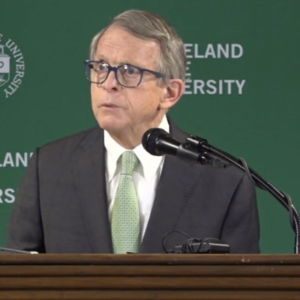Imagine a state where one person, by his or her own declaration, can make laws unilaterally; the court system that largely defers to that person; and the legislature’s attempts to rein in that person have been stymied by that same king-like ruler.
You don’t have to be too creative — this is not out of some dystopian novel. This is much of the United States for the past year.
It’s been a year since governors started their daily press conferences briefing citizens on what the government would allow them to do that day. In Ohio, “Wine with DeWine” merchandise commemorated the governor’s daily 2:00 p.m. COVID press conferences. New York Gov. Andrew Cuomo won an Emmy for his daily briefings.
At the beginning of the pandemic, as well as other times of emergency, the government may need the ability to act nimbly, and, perhaps, that is best achieved through an executive acting unilaterally. During those first few weeks of the pandemic, the new, rapidly changing information undermined the normal deliberative process in a legislative chamber. In those early days, we knew little about how Covid was transmitted, its lethality, or which populations were most susceptible to the disease.
Within days of their initial emergency declarations, governors began exercising those emergency powers to their fullest extent. Bars and sit-down restaurants were closed by governors in 49 states. Schools were closed by governors in every state. And in 46 states, citizens were ordered to stay home by their governors.
Emergency powers given to governors provide them with immense authority. In some states, emergency management statutes go as far as to give the governor the entire police power of the state, meaning they can make and enforce, almost without limit, all laws necessary to promote public health, safety, and welfare. That’s how over the last year governors have been able to close businesses, order people to stay home, categorize people as “essential” and “non-essential,” tell their citizens which types of healthcare they can receive, where they can go, what they can buy, and all with no legislative oversight. Under any other circumstance, we would label that type of government a “dictatorship.”
After one year, not a single governor, regardless of political party, has voluntarily ended their emergency declaration. In only one state, Michigan, has a court stepped in and ordered the emergency declaration over. But the Michigan state health department issued restrictions under another law.
Twelve months later, most Americans are still living under a governor’s edicts that have not been vetted or approved by their state legislature.
Whether you believe your governor’s emergency orders have been good, bad, or somewhere in between, rule by fiat is not allowed under our constitutional form of government. The greatest protector of individual liberty is dividing power among the branches of government. Making the laws that bind its citizens’ actions is the most dangerous power given to a government and should not be wielded by one person. That’s why the state’s largest democratic body and the one that stands for election most frequently, the legislature, is entrusted with that responsibility.
State legislatures are now stepping up to place safeguards on executive emergency powers and reassert their proper as the lawmaking body. Bills have been introduced across the country that would place time limits on emergency orders and require the governor to request any additional time from the legislature to extend their orders. Many of the bills would also end the loophole used by many governors that have simply reissued orders that expired or were rescinded by the legislature.
It’s far past time for each state to restore the separation of powers that ensures our liberty.

